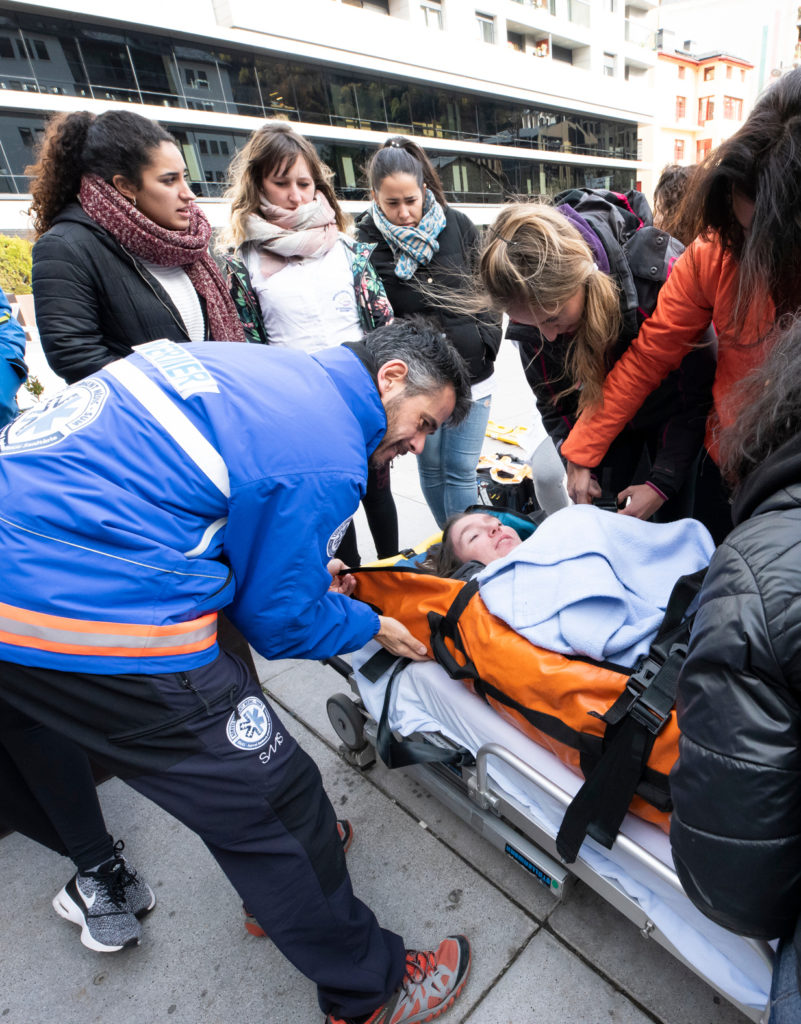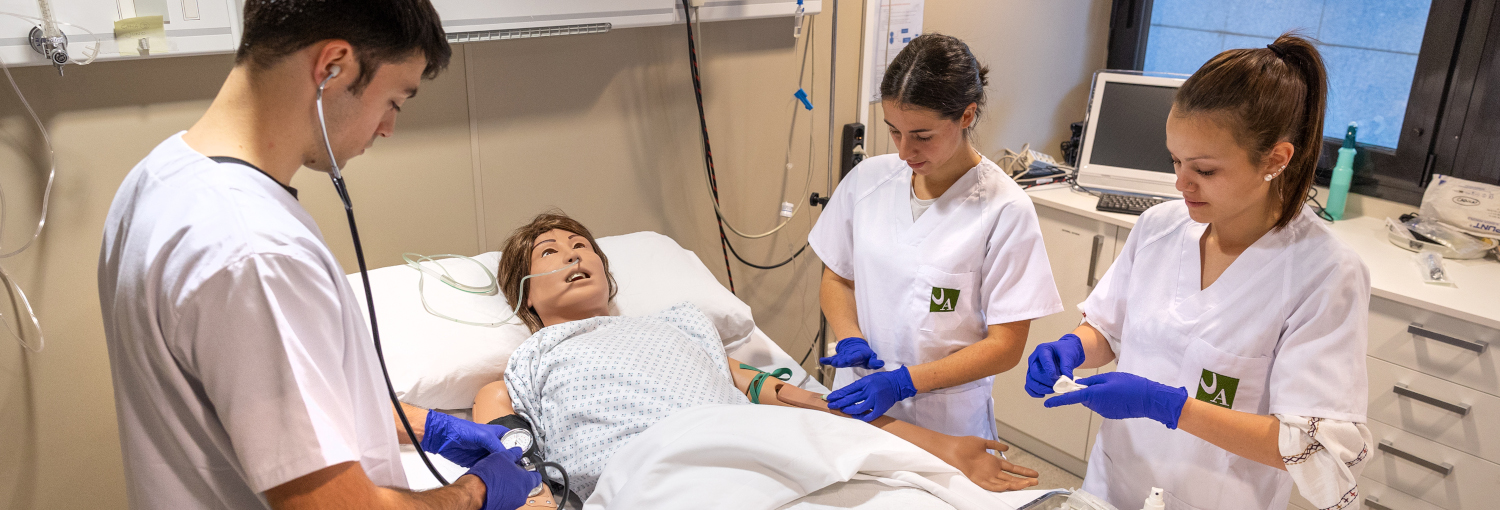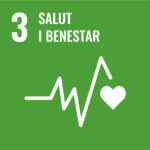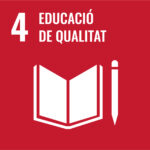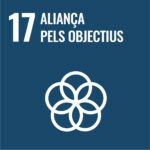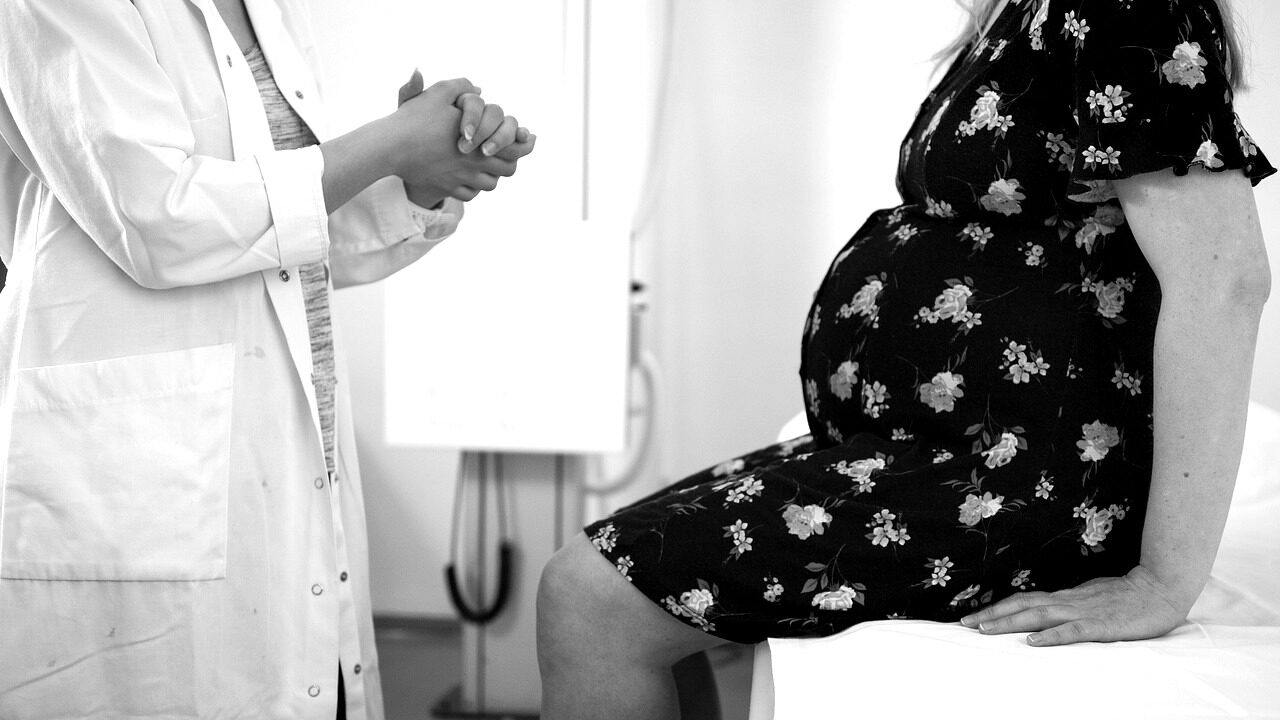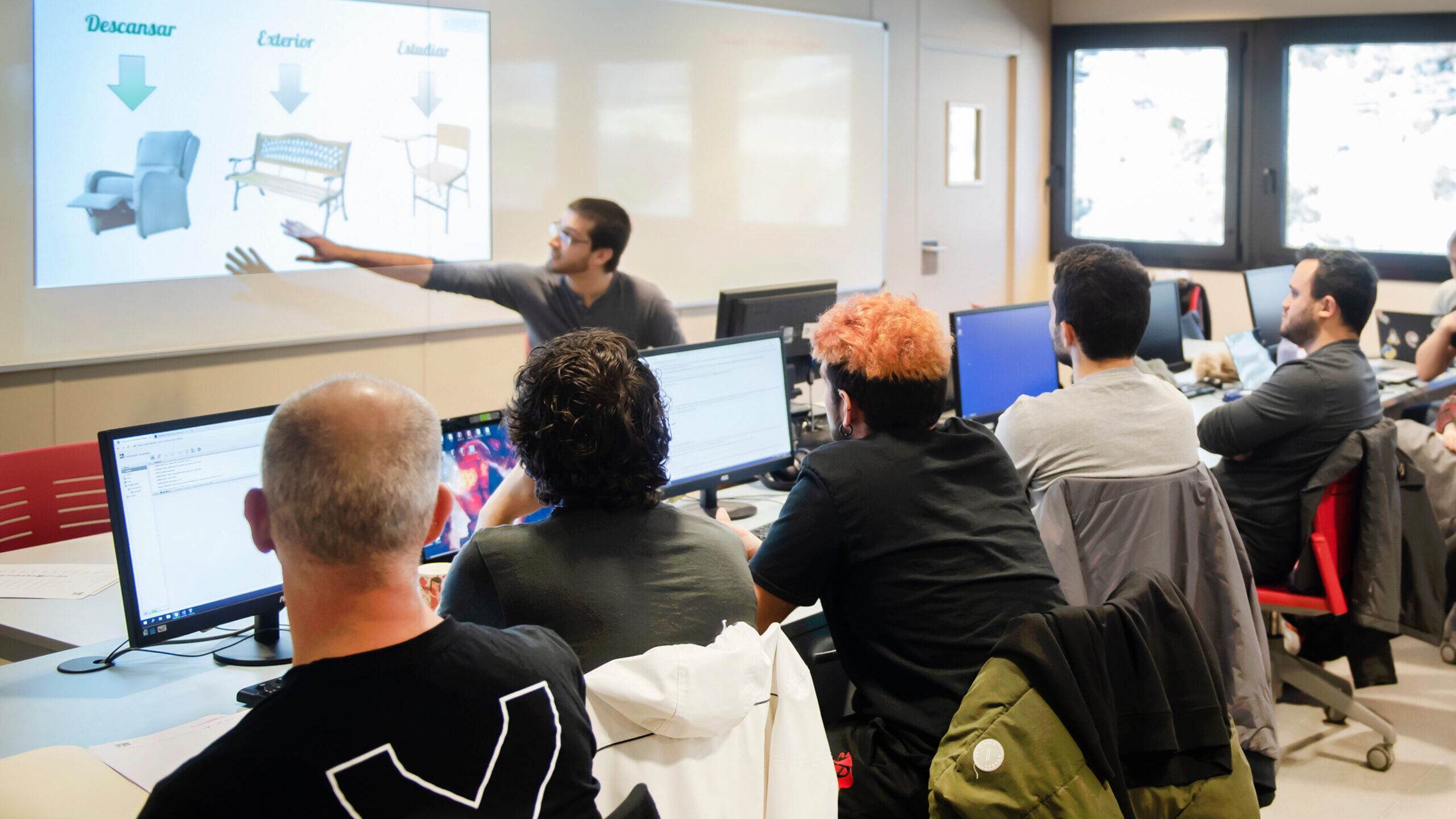Bachelor of Nursing
The Bachelor of Nursing seeks to train nurses with a generalist profile who can provide direct and indirect high-quality care for individuals, families, groups, communities and populations. The knowledge acquired allows them to design, manage and coordinate the care and act as members of the profession. This care is aimed at promoting, maintaining and recovering health, preventing unhealthy lifestyle behaviours and habits and caring for the sick.
The Bachelor of Nursing is evaluated and accredited by the AQUA (Andorran Agency for the Quality of Higher Education), which ensures its quality and European recognition. Students who pass these courses can obtain a Bachelor of Nursing, a state qualification issued by the Andorran Government.
Distinctive Features
Study programme adapted to the new educational model of the UdA, based on a competence-based methodology that eliminates the classic concept of subjects.
The students have laboratories with cutting-edge technology to carry out high-fidelity clinical simulations. The robotic dummies enable the students to interact with each other and learn to act in the most common cases, as well as more complex ones, making them better prepared and more secure in the periods with practical work, in real situations. The simulations are recorded on video in order to subsequently analyse the performance of each student.
The clinical internships, which are used to facilitate the application of the knowledge, skills and attitudes in real situations, can be completed at centres in Andorra, Spain, France, Portugal and Monaco.
The UdA offers grants to cover some of the costs resulting from the compulsory internships completed abroad.
The academic contents are divided into four areas: basic nursing, specialised nursing, medical sciences and the social and research area.
It includes some credits taught in English to reinforce the student’s communicative skills in this language and to encourage international mobility.
The employability rate of first-cycle degrees at UdA is 94% within the first six months (according to graduate employment surveys conducted by AQUA).
European level:
EHEA’s first cycle
Modality:
on-campus
Credit load:
180 European credits
Duration:
6 semesters
Languages:
Catalan and some credits in English
Calendar:
from September to June
Contact:
Judith Garcia Expósito (jgarciaes@uda.ad)
The study programme of the Bachelor of Nursing includes 180 European credits divided into:
- 103 European theory credits
- 77 European practical credits (clinical internships). The practical credits are distributed throughout semesters 2, 4 and 6 to facilitate the application of the knowledge, skills and attitudes in real situations.
The bachelor is structured in six semesters, and each one is divided into different modules, in which the student has to solve a challenge through guided work, personal work and seminars. The learning outcomes that lead to the acquisition of specific and transversal skills are thus being achieved.
Conditions to enrol for a module
Students will be able to follow the studies at part-time or full-time by enrolling each semester at 10 or 15 credits minimum, depending on the semester and a maximum of 30. In exceptional situations, it can be presented an enrolling inquiry for more credits which will be evaluated by the university’s academic managers.
To enrol for a module, the student must consult its requirements. It will also be necessary to consider the number of calls and permanence in the study programmes published in the Student Guide.
Applicants must hold one of the following qualifications:
- Andorran high school diploma
- Andorran Advanced Professional Diploma
- Access test to higher education for people aged over 25
Or an equivalent qualification, recognised by Government of Andorra.
Admission
Each year, 35 new places to study Nursing become available. If demand is greater than this, the allocation of places will be based on the following criteria:
- 60% of the score from the POB (Official Baccalaureate Exam) or equivalent.
- 20% of the score from the Catalan test conducted at UdA.
- 20% of the score from the French test conducted at UdA.
Students who obtain the Bachelor of Nursing at the University of Andorra will be able to obtain the following competences, among others:
CROSS-DISCIPLINARY COMPETENCES
- To communicate, orally and in writing, at least in Catalan and in English, including the analysis and summary of the discourse.
- To communicate with other people by providing information tailored to the needs of the interlocutor, to establish fluent communication and to work in inter-disciplinary and networked teams.
- To use strategies to predict and resolve problems, conflicts and changes in the professional field.
- To search for, manage, analyse and use the information independently in a professional environment.
- To know how to apply both analysis and synthesis to organise and plan work.
- To use and apply information technology in the academic and professional fields, abiding by the code of ethics and the current regulations.
- To be aware of the legal implications of professional activities.
- To know how to learn independently and update and further knowledge on a constant basis.
- To interpret and apply knowledge in accordance with ethical values.
SPECIFIC COMPETENCES
- To apply the nursing process by providing individualised care by means of assessment, data collection and the formulation of problems and nursing diagnoses.
- To evaluate the nursing process.
- To promote healthy lifestyles with actions promoting health, illness prevention and health education in the different healthcare areas.
- To manage resources in the application of protocols and procedures.
- To care for people in specific situations.
- Capacity for communication and relationships with patients, families, groups and communities.
- The ability to become involved in the performance of the nursing profession.
- Respect for the principles and ethical values that guide the profession and the rights of people.
- The ability to comprehend and understand the person in a holistic manner.
- The ability to use the skills and activities to provide optimal care in a suitable manner.
- The ability to lead, manage and work in teams in accordance with quality criteria.
The Nursing School at the University of Andorra has agreements with seventy hospitals and social healthcare and primary care centres both in and outside Andorra to enable the students to complete the compulsory clinical internships in university hours during part of the second semester and the fourth and sixth semesters.
Throughout the bachelor’s degree, a total of 6 clinical internship periods are established so that each student can understand the different fields of action: basic care, gerontological and geriatric care, maternity and women’s care, hospital and/or social healthcare, primary care, mental healthcare, community care, critical care and paediatric and children’s care.
The aim is for the students to implement their theoretical knowledge and, in the case of internships abroad, to get to know other health systems and to enhance their linguistic competences. To facilitate this compulsory academic mobility as much as possible, the University of Andorra offers grants to cover the costs of the internships.
During the clinical internships each student receives the support and accompaniment of a centre/service tutor and an academic tutor. The tutor guides the student through the process of learning and decision-making, both in real situations and by means of a process of reflection through learning and evaluation activities with the use of the pedagogical tools in the portfolios.
- Clinical internships guide (in Catalan)
- List of partner centres (in Catalan)
- Study Abroad
Simulation is an artificial representation of a real process through which the student acts and makes decisions, allowing them to acquire the necessary skills for appropriate professional practice and to provide quality care to the patient and their family in a specific context, following safety standards.
Simulation has become established as a fundamental teaching and learning methodology in competency-based training. It promotes the active participation of students in their own learning process, thus achieving more meaningful and competency-driven education.
Clinical simulation is essential in the training of future healthcare professionals, as it improves skills (technical, procedural, and communication-related), attitudes, and teamwork. It also allows the application of knowledge in specific contexts and contributes to decision-making.
Simulations vary depending on their level of fidelity or complexity, as follows:
Low-fidelity simulations:
- These are particularly suitable for a first contact with clinical practice.
- They are useful for the initial practice of basic technical skills of low complexity.
- They take place in spaces equipped with materials such as anatomical models, simple supplies, and static simulators for medication preparation and administration, wound care, etc.
Medium-fidelity simulations:
- These allow the practice of more complex technical skills that require greater interaction between the student and the simulator.
- They are conducted in spaces equipped with simulators that interact with the student and with anatomical models that offer a greater sense of visual and tactile realism.
- They also include role-playing activities, which enhance immersion in clinical situations and interaction with other professionals.
High-fidelity simulations:
- These offer a greater sense of realism and allow the practice not only of technical skills but also of non-technical skills such as critical thinking, decision-making, teamwork, interprofessional communication, and leadership.
- The spaces are equipped with highly complex and functional technological simulators that recreate real, complex scenarios, such as intensive care, emergency rooms, operating theatres, and also out-of-hospital care.
- Simulations are also considered high-fidelity when real people act out the scenario.
Director of the College of Health Sciences: Virginia Larraz Rada
Head of the School of Nursing: Judith Garcia Expósito (jgarciaes@uda.ad)
The teaching staff of the Bachelor of Nursing is made up of lecturers with extensive academic and professional experience.
The list of lecturers of the Bachelor can be viewed in the teaching plans of each of the modules, which have links on the study programme list.
In addition, the Directory of the University of Andorra enables students to search for and access the contact information on the UdA’s teaching, technical and administrative staff.
The Bachelor of Nursing offers a wide range of career opportunities, taking into account the changing health needs of society, the ageing population, the emergence of new diseases and the increase in chronic diseases:
- Management of nursing in the healthcare field
- Management, evaluation and provision of nursing care geared towards the promotion, maintenance and recovery of health and the prevention of illnesses and disabilities.
- Teaching, management and research.
As a regulated profession, the study programme of the Bachelor of Nursing is adapted to the current European guidelines, with 77 credits for clinical internships. The degree is recognised in France in accordance with the provisions of the Code de la Santé Publique, art. L4311-3.
The Bachelor of Nursing provides access to second cycle studies (master’s degrees) in the countries in the European Higher Education Area.
It also allows access to the specialised Bachelor of Obstetrical and Gynaecological Nursing (midwifery) taught at the UdA.
In addition, each year the University of Andorra designs a wide range of lifelong learning courses related to the health sciences area to meet the training needs of the profession.
Study programme publication (Official Gazette of the Principality of Andorra):
Andorran Agency for the Quality of Higher Education accreditation:
